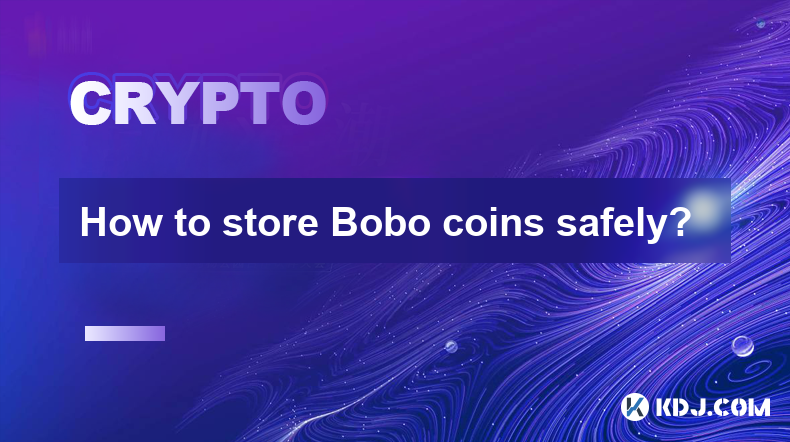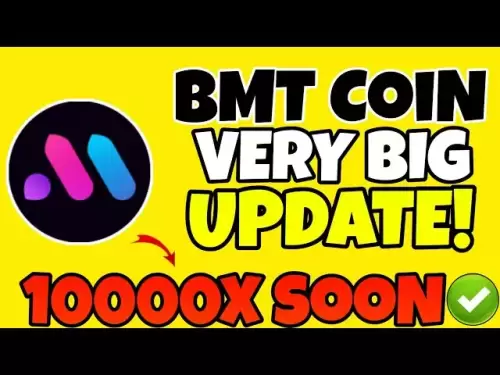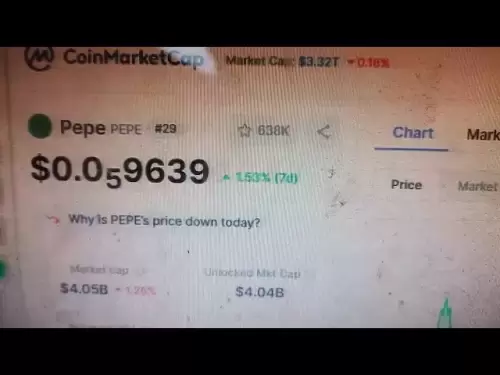-
 Bitcoin
Bitcoin $108,151.9523
0.11% -
 Ethereum
Ethereum $2,520.6389
0.26% -
 Tether USDt
Tether USDt $1.0002
0.00% -
 XRP
XRP $2.2654
2.16% -
 BNB
BNB $656.3481
0.23% -
 Solana
Solana $148.3243
0.26% -
 USDC
USDC $1.0000
0.00% -
 TRON
TRON $0.2847
0.24% -
 Dogecoin
Dogecoin $0.1655
1.16% -
 Cardano
Cardano $0.5789
1.10% -
 Hyperliquid
Hyperliquid $38.9650
-0.58% -
 Sui
Sui $2.8914
-0.61% -
 Bitcoin Cash
Bitcoin Cash $487.4743
1.11% -
 Chainlink
Chainlink $13.2128
0.30% -
 UNUS SED LEO
UNUS SED LEO $9.0219
-0.03% -
 Avalanche
Avalanche $17.9307
0.73% -
 Stellar
Stellar $0.2400
1.57% -
 Toncoin
Toncoin $2.9074
6.15% -
 Shiba Inu
Shiba Inu $0.0...01162
1.83% -
 Litecoin
Litecoin $87.2310
1.00% -
 Hedera
Hedera $0.1550
0.24% -
 Monero
Monero $314.8034
0.95% -
 Dai
Dai $1.0000
0.00% -
 Polkadot
Polkadot $3.3587
0.34% -
 Ethena USDe
Ethena USDe $1.0002
0.00% -
 Bitget Token
Bitget Token $4.3862
-0.27% -
 Uniswap
Uniswap $7.2908
4.86% -
 Pepe
Pepe $0.0...09825
1.65% -
 Aave
Aave $271.1484
-0.22% -
 Pi
Pi $0.4517
-1.99%
How to store Bobo coins safely?
When evaluating cryptocurrency wallets for storing Bobo coins, consider hardware wallets like Ledger Nano X or Trezor Model T for their offline storage, providing a strong defense against online threats.
Dec 27, 2024 at 07:42 am

Key Points of the Article:
- Choosing a safe and reputable cryptocurrency wallet
- Evaluating the security features of different wallet options
- Implementing additional security measures to protect your Bobo coins
Choosing a Safe and Reputable Cryptocurrency Wallet:
- Consider Hardware Wallets: Hardware wallets, such as the Ledger Nano X or Trezor Model T, provide a high level of security by storing your Bobo coins offline, making them inaccessible to hackers or online threats. Hardware wallets typically support multiple cryptocurrencies and offer advanced security features like multi-factor authentication and PIN protection.
- Review Software Wallets: Software wallets, such as MetaMask or Trust Wallet, are convenient and provide a user-friendly interface. However, they are less secure than hardware wallets as they are connected to the internet, making them vulnerable to cyberattacks. It's crucial to thoroughly research software wallets and choose those with strong security measures.
- Evaluate Exchange Wallets: Cryptocurrency exchanges, like Binance or Coinbase, offer built-in wallets for storing your Bobo coins. While these wallets are convenient for trading, they may not be as secure as dedicated hardware or software wallets. Exchanges hold your private keys, which can be compromised in case of a breach or hack.
Evaluating the Security Features of Different Wallet Options:
- Multi-Factor Authentication: Look for wallets that offer multi-factor authentication (MFA), such as Google Authenticator or SMS verification. MFA adds an extra layer of security by requiring you to provide multiple forms of verification when accessing your wallet.
- Biometric Authentication: Some wallets support biometric authentication, such as fingerprint or facial recognition. This feature provides an additional level of security by ensuring that only the authorized owner can access the wallet.
- Seed Phrase: When setting up a wallet, it's essential to secure your seed phrase, a list of randomly generated words that serve as a backup key to your wallet. Store your seed phrase offline and never share it with anyone.
Implementing Additional Security Measures to Protect Your Bobo Coins:
- Use a Password Manager: Store your wallet passwords in a secure password manager, which encrypts and protects your login credentials from unauthorized access.
- Enable Two-Factor Authentication on Exchanges: If you choose to store your Bobo coins on an exchange, enable two-factor authentication on your exchange account to enhance security.
- Be Vigilant of Phishing Attacks: Avoid clicking on suspicious links or providing your personal information in response to unsolicited emails or messages. Phishing scams attempt to trick you into disclosing your wallet credentials.
FAQs:
What is the safest way to store Bobo coins?
- Hardware wallets are considered the safest option for storing Bobo coins due to their offline storage, minimizing online vulnerabilities.
Are software wallets secure enough for Bobo coins?
- While software wallets offer convenience, they are less secure than hardware wallets. Choose reputable software wallets with strong security measures, such as multi-factor authentication and seed phrase backup.
Can I store Bobo coins on cryptocurrency exchanges?
- Exchanges offer built-in wallets, which are convenient for trading but may be less secure than dedicated hardware or software wallets. It's recommended to withdraw your Bobo coins to a secure personal wallet for long-term storage.
What additional security measures can I take to protect my Bobo coins?
- Implement multi-factor authentication, use a password manager, enable two-factor authentication on exchanges, and be vigilant of phishing attacks to minimize the risk of unauthorized access.
Disclaimer:info@kdj.com
The information provided is not trading advice. kdj.com does not assume any responsibility for any investments made based on the information provided in this article. Cryptocurrencies are highly volatile and it is highly recommended that you invest with caution after thorough research!
If you believe that the content used on this website infringes your copyright, please contact us immediately (info@kdj.com) and we will delete it promptly.
- Litecoin Breakout Watch: What Traders Need to Know Now
- 2025-07-06 16:50:13
- Bitcoin, Solana, Ethereum: Decoding the Latest Buzz on the Blockchain
- 2025-07-06 16:50:13
- Widnes Resident's 50p Could Be Your Ticket to Easy Street: Rare Coin Mania!
- 2025-07-06 16:55:13
- Bitcoin, Solaris Presale, and Token Rewards: What's the Buzz?
- 2025-07-06 16:55:13
- Ethereum Under Pressure: Price Drop Amid Global Uncertainties
- 2025-07-06 17:00:13
- XRP, SEC Case, and Prosperity: A New Era for XRP Holders?
- 2025-07-06 17:10:13
Related knowledge

How to customize USDT TRC20 mining fees? Flexible adjustment tutorial
Jun 13,2025 at 01:42am
Understanding USDT TRC20 Mining FeesMining fees on the TRON (TRC20) network are essential for processing transactions. Unlike Bitcoin or Ethereum, where miners directly validate transactions, TRON uses a delegated proof-of-stake (DPoS) mechanism. However, users still need to pay bandwidth and energy fees, which are collectively referred to as 'mining fe...

USDT TRC20 transaction is stuck? Solution summary
Jun 14,2025 at 11:15pm
Understanding USDT TRC20 TransactionsWhen users mention that a USDT TRC20 transaction is stuck, they typically refer to a situation where the transfer of Tether (USDT) on the TRON blockchain has not been confirmed for an extended period. This issue may arise due to various reasons such as network congestion, insufficient transaction fees, or wallet-rela...

How to cancel USDT TRC20 unconfirmed transactions? Operation guide
Jun 13,2025 at 11:01pm
Understanding USDT TRC20 Unconfirmed TransactionsWhen dealing with USDT TRC20 transactions, it’s crucial to understand what an unconfirmed transaction means. An unconfirmed transaction is one that has been broadcasted to the blockchain network but hasn’t yet been included in a block. This typically occurs due to low transaction fees or network congestio...

How to check USDT TRC20 balance? Introduction to multiple query methods
Jun 21,2025 at 02:42am
Understanding USDT TRC20 and Its ImportanceUSDT (Tether) is one of the most widely used stablecoins in the cryptocurrency market. It exists on multiple blockchain networks, including TRC20, which operates on the Tron (TRX) network. Checking your USDT TRC20 balance accurately is crucial for users who hold or transact with this asset. Whether you're sendi...

What to do if USDT TRC20 transfers are congested? Speed up trading skills
Jun 13,2025 at 09:56am
Understanding USDT TRC20 Transfer CongestionWhen transferring USDT TRC20, users may occasionally experience delays or congestion. This typically occurs due to network overload on the TRON blockchain, which hosts the TRC20 version of Tether. Unlike the ERC20 variant (which runs on Ethereum), TRC20 transactions are generally faster and cheaper, but during...

The relationship between USDT TRC20 and TRON chain: technical background analysis
Jun 12,2025 at 01:28pm
What is USDT TRC20?USDT TRC20 refers to the Tether (USDT) token issued on the TRON blockchain using the TRC-20 standard. Unlike the more commonly known ERC-20 version of USDT (which runs on Ethereum), the TRC-20 variant leverages the TRON network's infrastructure for faster and cheaper transactions. The emergence of this version came as part of Tether’s...

How to customize USDT TRC20 mining fees? Flexible adjustment tutorial
Jun 13,2025 at 01:42am
Understanding USDT TRC20 Mining FeesMining fees on the TRON (TRC20) network are essential for processing transactions. Unlike Bitcoin or Ethereum, where miners directly validate transactions, TRON uses a delegated proof-of-stake (DPoS) mechanism. However, users still need to pay bandwidth and energy fees, which are collectively referred to as 'mining fe...

USDT TRC20 transaction is stuck? Solution summary
Jun 14,2025 at 11:15pm
Understanding USDT TRC20 TransactionsWhen users mention that a USDT TRC20 transaction is stuck, they typically refer to a situation where the transfer of Tether (USDT) on the TRON blockchain has not been confirmed for an extended period. This issue may arise due to various reasons such as network congestion, insufficient transaction fees, or wallet-rela...

How to cancel USDT TRC20 unconfirmed transactions? Operation guide
Jun 13,2025 at 11:01pm
Understanding USDT TRC20 Unconfirmed TransactionsWhen dealing with USDT TRC20 transactions, it’s crucial to understand what an unconfirmed transaction means. An unconfirmed transaction is one that has been broadcasted to the blockchain network but hasn’t yet been included in a block. This typically occurs due to low transaction fees or network congestio...

How to check USDT TRC20 balance? Introduction to multiple query methods
Jun 21,2025 at 02:42am
Understanding USDT TRC20 and Its ImportanceUSDT (Tether) is one of the most widely used stablecoins in the cryptocurrency market. It exists on multiple blockchain networks, including TRC20, which operates on the Tron (TRX) network. Checking your USDT TRC20 balance accurately is crucial for users who hold or transact with this asset. Whether you're sendi...

What to do if USDT TRC20 transfers are congested? Speed up trading skills
Jun 13,2025 at 09:56am
Understanding USDT TRC20 Transfer CongestionWhen transferring USDT TRC20, users may occasionally experience delays or congestion. This typically occurs due to network overload on the TRON blockchain, which hosts the TRC20 version of Tether. Unlike the ERC20 variant (which runs on Ethereum), TRC20 transactions are generally faster and cheaper, but during...

The relationship between USDT TRC20 and TRON chain: technical background analysis
Jun 12,2025 at 01:28pm
What is USDT TRC20?USDT TRC20 refers to the Tether (USDT) token issued on the TRON blockchain using the TRC-20 standard. Unlike the more commonly known ERC-20 version of USDT (which runs on Ethereum), the TRC-20 variant leverages the TRON network's infrastructure for faster and cheaper transactions. The emergence of this version came as part of Tether’s...
See all articles

























































































